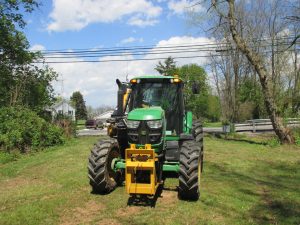Question: There is a manhole in my yard and my neighbors tell me there is an easement through my property. What does that mean?
Answer: A law book definition is: An easement, a privilege to pass over the land of another, whereby the holder of the easement acquires only a reasonable and usual enjoyment of the property and the owner of the land retains the benefits and privileges of ownership consistent with the easement.
What this means in simple terms is that the township has received from the property owner an agreement for the township to use a certain portion of the land and this agreement is part of the deed for the property. This means that it doesn’t matter if the land is sold. The easement (also called right-of-way) is tied to land, no matter who owns it. In your case, it refers to a strip of land, usually 20 feet wide, for the sewer to go through your property. The sewer itself may only be a foot or two wide. However, the width of the easement must be wider so that construction vehicles and other maintenance equipment can access it.
Question: OK, so there is a sewer going through my yard. How does this affect how I use my yard?
 Answer: Commonsense applies. Definitely don’t dig up your yard where the sewer is. Don’t build or place anything that could block access to the sewer. Don’t plant trees or bushes in that area. The township has a program of cleaning and inspecting sewers in the township. We need to get our vehicles and equipment to the manholes for routine maintenance. How frequently depends on the location and previous problems in that area. Most likely, a crew would check the manholes every couple of years. The worst-case scenario would be a drastic failure of the sewer itself, usually a break or collapse of the pipe. Whenever possible, we try to repair it from the inside out and avoid digging. However, it is possible that the sewer may have to be dug up and replaced. If you have a shed, garage, or other structure within the right-of-way, you may lose it at your expense. Structures that overhang over the easement, such as decks or patio roofs, may interfere with the equipment that could be used in the right-of-way. Again, there may be a chance of damage at the property owner’s expense.
Answer: Commonsense applies. Definitely don’t dig up your yard where the sewer is. Don’t build or place anything that could block access to the sewer. Don’t plant trees or bushes in that area. The township has a program of cleaning and inspecting sewers in the township. We need to get our vehicles and equipment to the manholes for routine maintenance. How frequently depends on the location and previous problems in that area. Most likely, a crew would check the manholes every couple of years. The worst-case scenario would be a drastic failure of the sewer itself, usually a break or collapse of the pipe. Whenever possible, we try to repair it from the inside out and avoid digging. However, it is possible that the sewer may have to be dug up and replaced. If you have a shed, garage, or other structure within the right-of-way, you may lose it at your expense. Structures that overhang over the easement, such as decks or patio roofs, may interfere with the equipment that could be used in the right-of-way. Again, there may be a chance of damage at the property owner’s expense.
Question: Why didn’t the township keep all the sewers in the streets and avoid easements?
Answer: Cost effectiveness. When a sewer system is planned out, the engineers try to use gravity for flow of sewage. Pumping stations are very expensive to build and very expensive to operate and maintain. These pumping stations require large horsepower motors which are costly in electricity. Additional people would have to be hired by the township to maintain the pumping stations. Dover Township is located in a hilly area. To have a sewer system totally within roadways would have been costly and might have resulted in doubling your quarterly sewer bill.
Question: Is it dangerous for my family?
Answer: Not unless someone removes the manhole lid. These lids are heavy and difficult to move. In non-road areas, lids may be bolted downed with 1/2” steel bolts for extra protection. If you see a manhole lid off, call 911 immediately. The township crew will reinstall the lid.
More Sanitary Sewer Information




